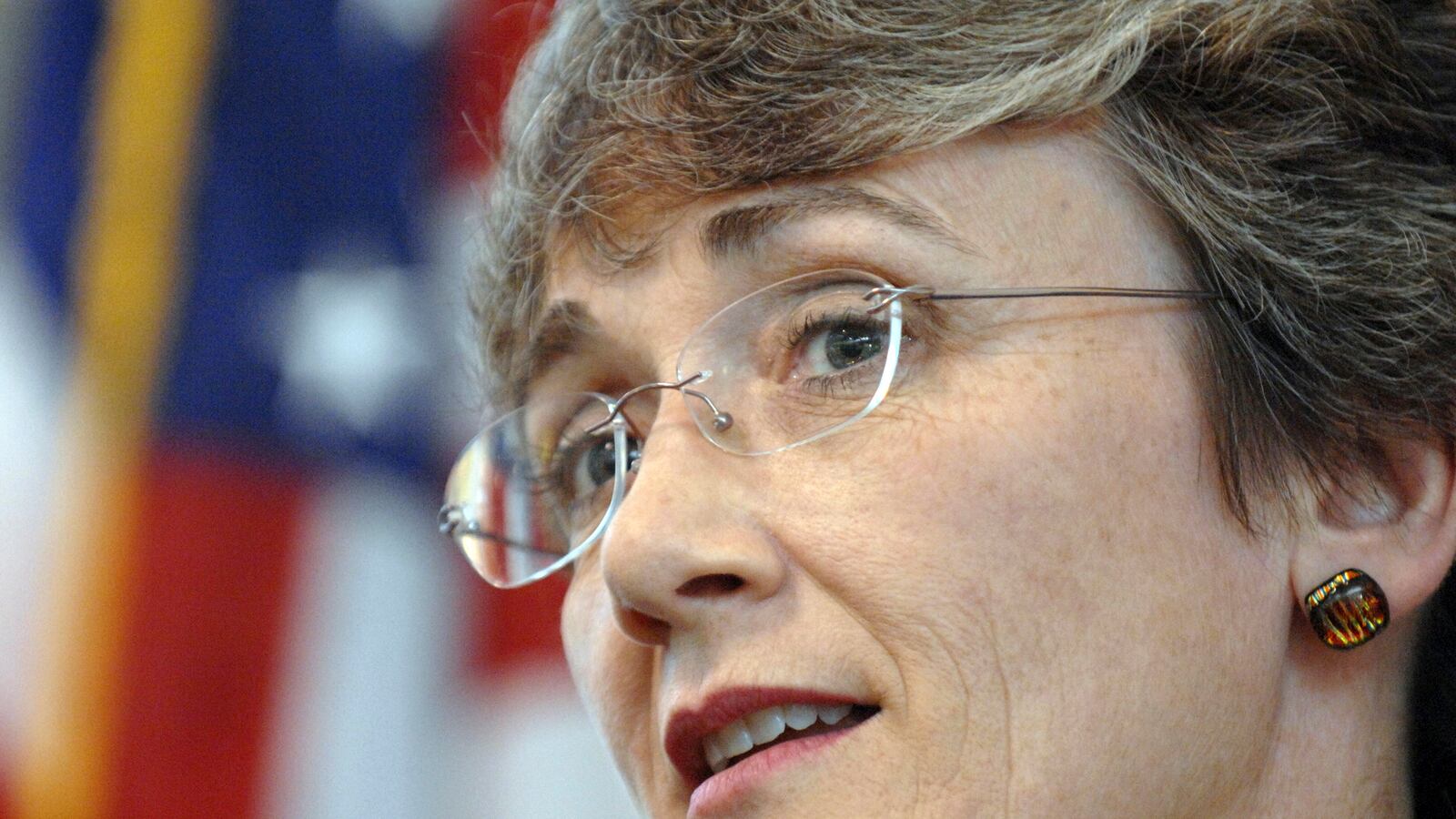By Patrick Malone and R. Jeffrey Smith, Center for Public Integrity
Donald Trump famously promised to “drain the swamp” in Washington—to rein in lobbyists, shut the revolving door and curb the influence of well-heeled special interests. But so far, he’s had a hard time keeping this promise, with Wall Street veterans headed to the Treasury Department, coal industry advocates appointed to safeguard the environment, and now a former nuclear weapons industry consultant named to a job overseeing the purchase of such weapons.
Trump’s nominees for Army secretary and Navy secretary have both recently stepped aside because of concerns over how those jobs might conflict with their private business interests. But he’s designated as the new Air Force secretary a former New Mexico Congresswoman, Heather Wilson, who’s a veteran of wheeling and dealing in Washington on behalf of private defense industry clients that paid her lucrative consulting fees.
Just a day after she left Congress in 2009, Wilson went to work as a “strategic adviser” for Sandia Corporation in Albuquerque, which runs a laboratory that helps design and manufacture America’s nuclear weapons and is a subsidiary of defense giant Lockheed Martin. The contract to run Sandia was coming to an end, and Wilson’s assignment was to convince the government to extend it without competition. Soon after, she took on a similar advising role for contractors running Los Alamos National Lab, another designer and maker of nuclear bombs.
But federal auditors at the Energy Department and one of its subsidiary agencies quickly grew alarmed because Wilson refused to account for how she was spending any of her time, even while accepting $20,000 monthly from the national labs. That prompted one auditor to call a fraud hotline operated by the Justice Department, which then kicked off an investigation of its own.
The Justice probe concluded that the payments to Wilson were part of an improper effort by the Lockheed subsidiary to bill the government for money spent lobbying the government for more business. The Lockheed Martin subsidiary settled those allegations in 2015 by paying the government $4.7 million, but denied any wrongdoing. So did Wilson.
But now, if Wilson is confirmed, she’ll be responsible for overseeing the Air Force’s voluminous interactions with Lockheed — the same firm that paid her $226,378 for two years of “strategic advising.” And Lockheed is not just another contractor. As of 2015, the latest year available, Lockheed had 3,982 outstanding Air Force contracts worth $7.4 billion — making it the largest single contractor to the Air Force. One of the biggest of those contracts involves the F-35 fighter jet, a plane that has been plagued by massive cost overruns and technical snafus.
Critics have argued that some parts of the F-35 program should be put out for competitive bid, an idea that Lockheed has resisted. “Competition is not in the best interest of the government,” Wilson told Sandia and Lockheed officials to tell Washington policymakers in July 2009, according to a copy of one of her emails.
House Armed Services Committee chairman Mac Thornberry (R-Tex.) said in a statement earlier this month that Wilson is “an excellent choice” for Air Force secretary. “I know her to be a serious and thoughtful leader who is well-equipped,” Thornberry said, “to meet the challenges we face in national security.”
But others aren’t so certain. Gordon Adams, the former associate director for national security at the Office of Management and Budget, said Wilson has “the appearance of a conflict of interest, and appearances matter.” Adams said Wilson “should probably recuse herself from anything involving Lockheed.” But, he added, “That’s tricky—in particular for the F-35, because it’s a big part of the job.”
Jay Coghlan, executive director of Nuclear Watch New Mexico, an anti-nuclear watchdog group in Wilson’s home state, was even more skeptical.
Wilson’s work for Lockheed Martin and other nuclear contractors “obviously raises very serious ethical questions,” Coghlan said. Coghlan conceded that the recent presidential election represented a vote for change, but added that “part of that change should be appointing ethical people to senior positions. And [Wilson has] failed that test.”
An Air Force background
Wilson’s resume is not an illogical one for her proposed new positon. A 1982 graduate of the Air Force Academy and a pilot herself, Wilson served on the National Security Council staff under Pres. George H.W. Bush and then spent 10 years in the House, where she served on the House Armed Services Committee and the Intelligence Committee.
But after losing a Senate primary battle, Wilson moved expeditiously to capitalize on her experience and make money by forming a consulting firm that quickly won work both from the Lockheed subsidiary that ran Sandia and a group of contractors that ran Los Alamos. In addition to the $226,378 she earned from Lockheed for the Sandia work, she also earned $195,718 for representing Los Alamos for two years.
But the ways she went about her work drew questions from a variety of federal auditors, some of which were detailed in emails and documents obtained by the Center for Public Integrity under the Freedom-of-Information-Act. Among the revelations: that auditor’s call to a Justice department hotline.
But there was more.
A June 2013 Energy Department inspector general’s report said none of the invoices Wilson’s firm sent to the labs contained enough details to conclude she actually provided all the services the firm promised. The report also called “the circumstances surrounding the award and execution of [Wilson’s contracts]…unusual and in some instances, highly irregular,” noting the absence of any specified “deliverables,” contrary to department regulations.
DOE officials complained in part that Wilson’s silence had blocked their efforts to determine whether she was billing the labs fairly or improperly collecting fees from more than one lab for doing essentially the same work. On at least two occasions while acting as a consultant, for example, Wilson occupied a single seat at government meetings in Washington, but collected two paychecks from firms running separate labs, which subsequently each billed the government for those expenses.
“Wilson billed both [Los Alamos] and [Sandia] full consultant costs,” IG investigators wrote about a June 2010 meeting Wilson attended. “Invoices do not describe work performed that was unique to each laboratory.” She billed the labs in the same way after unspecified December 2010 meetings in Washington.
A Sandia official had expressed similar misgivings. “We don’t do business with anyone else like this and prefer that this contract go away,” the unnamed Sandia official said, according to the IG report.
A Sandia laboratory contracting official told investigators in an interview on Jan. 29, 2013, that when Sandia requested that Wilson fill out a time record, “Ms. Wilson refused to do it.” An official at Los Alamos similarly told the investigators that “Ms. Wilson was very direct with him, stating that she was not going to account for her time in any detail.”
Asked this month in emails for comment about this account, Wilson did not respond. She also did not respond to phone calls.
Ironically, Wilson's contracts explicitly stated that she “shall not engage in any activity specifically related to obtaining, retaining, or facilitating business or business opportunities for the respective National Laboratories” — evidently because those are non-reimbursable expenses.
“Despite these prohibitions, our examination of relevant documentation at both Sandia and Los Alamos tend to indicate such activities,” the investigators’ summary said.
In an email to the Center in 2015, Wilson denied she ever directly lobbied on behalf of Sandia. “And I did not contact any federal official – Congressional or Executive – to try to extend the Sandia contract,” Wilson wrote. However, she did not respond to questions about her work for Los Alamos or discuss the issue of drumming up new business for the labs under their existing contracts.
Ultimately, her work advising Lockheed on how to avoid a rebidding of the Sandia contract was unsuccessful. The National Nuclear Security Administration, which oversees the nuclear weapons laboratories, decided in Dec. 2011 to solicit other bids. In January, the Energy Department awarded the new Sandia contract to group of private firms that did not include Lockheed, without detailing why.
No constraints
In Wilson’s new job as Air Force secretary, she apparently won’t be constrained from making any decisions about her former client Lockheed. While an executive order signed by Trump on Jan. 28 bars top officials from working on particular matters that are directly or substantially related to the work did for private-sector clients, it only applies to work done within the past two years; Wilson’s known work for Lockheed preceded the two-year period governed by the order.
Trump announced Wilson as his choice for Air Force secretary on Jan. 23. Wilson hasn’t submitted the required pre-confirmation financial disclosure to the Office of Government Ethics. Her confirmation hearing before the Senate Armed Services Committee has not yet been scheduled.
But her nomination now represents the last chance for President Trump to get one of his first choices for service secretary installed.
Army secretary nominee Vincent Viola, a Wall Street trader with a personal net worth estimated at $1.8 billion, withdrew from consideration on Feb. 3. The challenges of breaking ties with his businesses “have proven insurmountable,” Viola’s camp said in a written statement.
Then on Sunday, Navy secretary nominee Philip Bilden stepped aside. He cited worries that submitting required ethics documents describing his business connections would cause “undue disruption and materially adverse divestment of my family’s private financial interest,” Bilden said in a written statement. Bilden recently retired from Harbourvest Partners LLC, which the White House described as “a global private equity investment management firm” with assets exceeding $42 billion.






